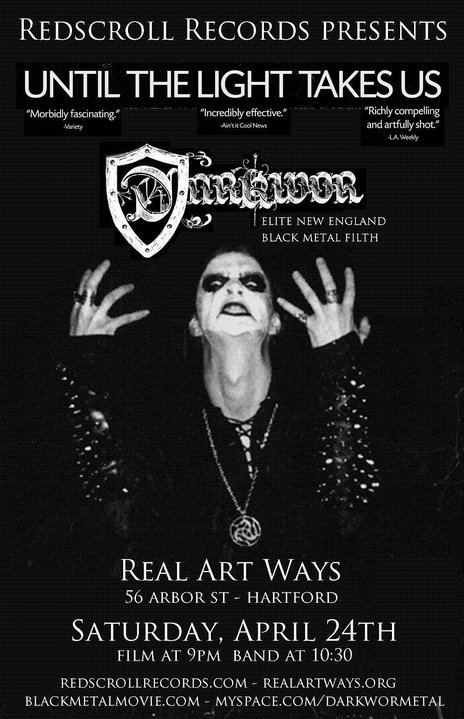The index to the Comics and Music roundtable is here.
_____________

Black Metal Fandom
In the framing of the documentary “Until the Light Takes Us,” the pheonomenon of Black Metal was born and died in the same instant as the publication of sensational reports in the Norwegian media of the activities of Varg Vikerness and the supposed “inner circle” of musicians and agitators retroactively called the second wave of black metal. The aesthetic and thematic trappings of the world-wide scene to come, including, paradoxically, the adherent reverence to the supposed ideals of the original inner circle who despise and disavow all those who follow them, are cribbed almost entirely from these (mostly false) accounts of Satanism, Anarchism, and (unfortunately true) pointless grisly murder.
Punk Rock died in Los Angeles in 1986, according to some sources. It emerges, Elvis-like, on the underside of skateboards coasting across uneven gravel mall parking lots, or in communal houses in the suburbs of Rangoon, and in endlessly concurrent music documentaries about the life and death of Punk Rock, year after year.
Disco died when white people started making it and other white people got real mad. The whole scenario is pretty embarrassing in general. I’m glad I hadn’t been born at the time.
&The children’s television program My Little Pony: Friendship is Magic something something bronies blah blah siiiiiiiiiiiiigh.
Superheroes never die. They just get new writers who sometimes kill them. But later, new writers – and who knows?!
My favorite manga should have ended like, ten volumes agooooo. It just doesn’t seem like it’s going anywhere.
***
What bugs me about semi-autobiographical works is that an author can always ascribe the lousy parts of their stories to the fixed continuity of the supposed “autobio” part. Jonathan Lethem’s toad of a novel “Fortress of Solitude” sets its story against the backdrop of Brooklyn in the waning of the 20th century. So it makes perfect narrative sense that after the dissolution of the possibility and wonder of the childhood friendship of the book’s two heroes, Mingus gets chewed up and his talent suppressed by the intertwined terrors of drug addiction and the criminal justice system as his neighborhood is gentrified in real time. Dylan, the more privileged of the two, more or less becomes a dried-up old turd from the moment he begins to monetize his passions, to value things over people and to vaporize his yen for music and culture into the loveless prison of obsessive collection and curation. The fact that the former character is black and the latter white is no accident, it’s just fate. Too bad the semi-autobiographical author was only semi-interested in designing a universe with less banal systematic cruelty along with the addition of magical rings of power.
***
Being a fan draws a lot of people into happiness and/or success as creators in comics. But as fandom becomes more visible and defined in our consumer culture, a vocal following can blur the line between fan/participant and master and enforce rules that no one can remember writing in the first place. Just like the lions eat the antelope and the lions turn to a grass lot which gets built up into a boutique for silk-screened baby onesies and the antelope get pushed out of their neighborhoods by rent hikes, whole artforms can be scuttled by the arbitrary curation of its fans when the joy of discovery becomes the rote drudgery of collection.
I didn’t mention furries in this essay-ette, so it’s not canon.

“Don’t call me a fucking BRONY, ok?”
